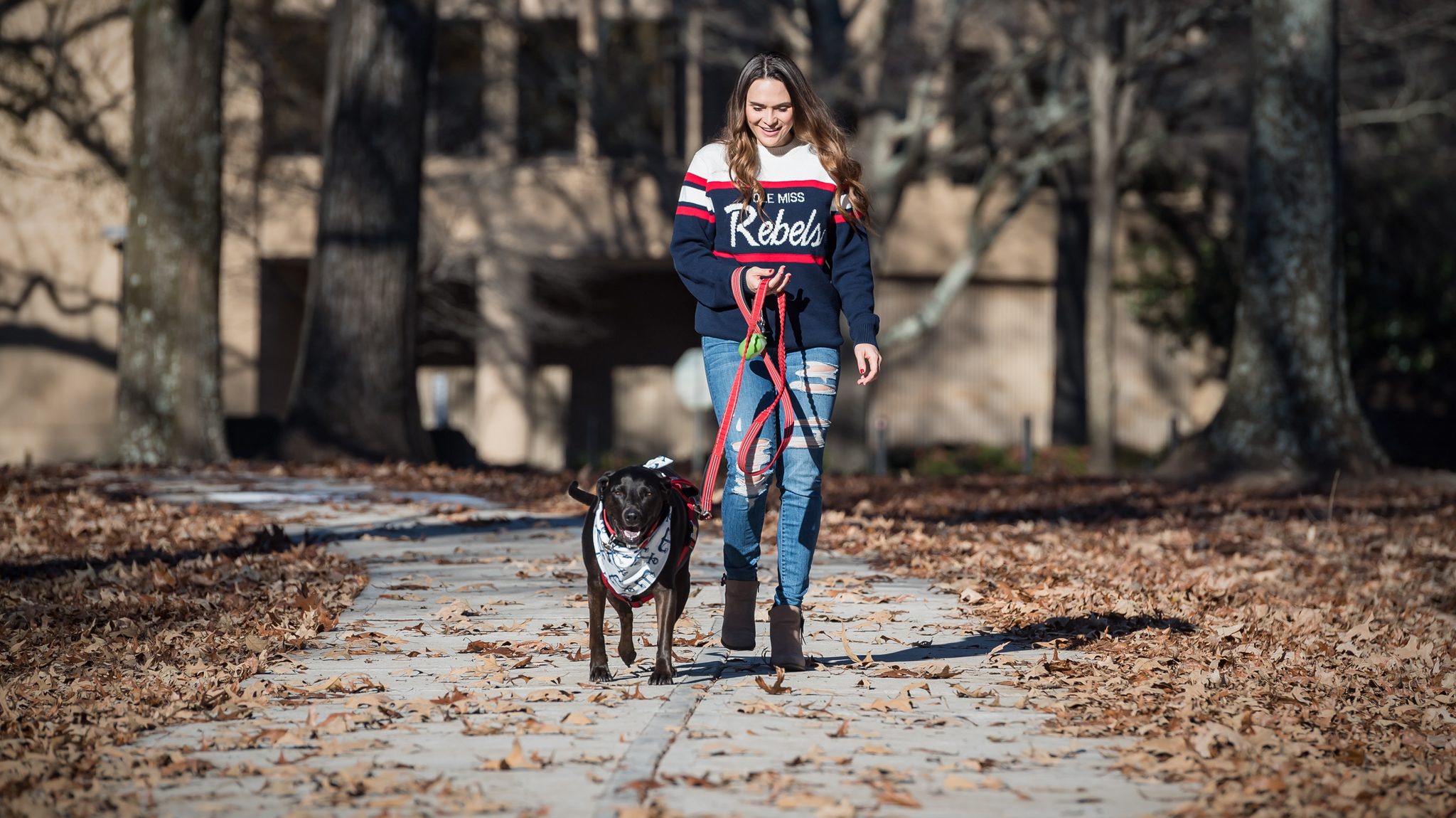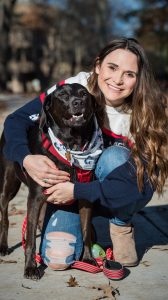
UM accounting major Lauren Graham walks her emotional support dog, Lilly, on campus. Graham is a military veteran who received help from the university’s Veterans Treatment Team to deal with anxiety and stress. Photo by Megan Wolfe/Ole Miss Digital Imaging Services
OXFORD, Miss. – Lauren Graham came to the University of Mississippi for a second chance after a tragic incident ended her blossoming career as a nuclear electrician’s mate for the United States Navy.
Graham was a few months away from completing training at the Navy’s Nuclear Power School when she was assaulted while out for a run. The attack landed her in the hospital, and medication provided to her during treatment ultimately disqualified her from serving in the Navy’s nuclear program.
“I decided to come back to school and start my life over,” said the junior accounting major from Fisher, Texas. “I came to Ole Miss because I fell in love with how wonderful the campus is.”
When she got to Ole Miss, anxiety from the traumatic event hindered her college experience. She rarely left her apartment and would not walk the campus after dark.
But help was on the way.
Graham would soon learn of the university’s Veterans Treatment Team, a program that would provide the support she needed to fight her anxiety and grow as a student.
Veterans Treatment Team
Andrew Newby made it a priority when he arrived at Ole Miss in August 2017 to provide a safety net to catch student veterans when any of the various issues that stem from a life of service begin to inhibit their education.
“They are parents, they are students, they are veterans,” said Newby, assistant director of the Office of Veteran and Military Services. “They have all these different identities they have to balance.
“But if you’re at Ole Miss, I want you to be a student. I want you to get a degree.”
The Veterans Treatment Team’s stated goal is to give “student veterans attending Ole Miss the ability to receive treatment at the university for anything they may need while in school.”
Newby’s idea was to use the resources already at the university and form a team that can collaborate and direct student veterans to the care they need that is already available on campus instead of having them drive hours away to a VA facility.
“We have physicians, psychiatrists, psychologists, social workers and academic specialists that can help manage the different aspects of who a student veteran is,” he said.
It was through the Veterans Treatment Team that Graham was linked with Ann L. “Jeni” Bond, a family psychiatric mental health nurse practitioner with the university’s Student Health Services.
Bond began working with Graham on battling her anxiety.
“Being able to talk and have that support system really allowed me to own what happened to me instead of being ashamed of it,” Graham said.

UM junior Lauren Graham is vice president of the Student Veterans Association. When she enrolled at Ole Miss, anxiety from a previous traumatic event prevented her from immersing herself in the university experience. With help from the university’s Veterans Treatment Team, Graham feels comfortable on campus, has joined a sorority and is active in the SVA. Photos by Megan Wolfe/Ole Miss Digital Imaging Services
Bond also assisted Graham in acquiring Lilly, an emotional support dog. The black Labrador retriever, along with treatment she received, made all the difference in Graham’s experience as a student, she said.
“(The treatment) definitely helped me feel comfortable in class,” Graham said. “Last year, I never studied on campus and wouldn’t be on campus when the sun went down. Now, I feel comfortable being here.”
Graham is in a sorority and serves as vice president of the Student Veterans Association. She often walks Lilly on campus and having the dog makes her more comfortable.
“It’s really allowed me to go all in and actually try to be a part of the campus,” she said.
How the Treatment Team works
The process to create a comprehensive treatment team for student veterans began by pinpointing professionals on campus who could collaborate within the confines of HIPAA guidelines and work with student veterans to assess their health needs.
“We are looking at a holistic picture,” said Kate Forster, a case manager in the Office of Leadership and Advocacy and member of the Veterans Treatment Team. “We wanted to address everything from academic support, personal and social support, mental health, counseling and medical health care.
“We have so many great resources here, but if you don’t have a team that’s looking at the whole picture, it can feel very siloed.”
Forster said her role with the team is to identify the unique needs of the student veteran population, who generally are “nontraditional” students who may vary in age and life experiences. Many have family, financial and work responsibilities that traditional students may not face, she said.
“I think certainly there is a mental health aspect that is very unique to this population,” she said. “Mental health needs are common with college students in general, but the particular concerns that veterans may be facing in terms of trauma, PTSD, suicidality, depression and anxiety are well-known, and that’s something we have to pay attention to.”
Mental health issues often manifest themselves in physical ailments, Forster said, and that’s why the multidepartment collaboration of the Veterans Treatment Team is key.
The important thing is letting the military veterans know the service is available in a hassle-free environment, said Dr. Travis Yates, director of University Health Services. Yates said he sees student veterans for a variety of concerns, both physical and mental.
“Many of the veterans are pretty stoic people,” he said. “They don’t come in for little nickel-and-dime-type things. Some of the veterans don’t want to tell me they are depressed or anxious, but I try to break those barriers down.
“We can offer more prompt service than they can get at the VA, and I just want them to know there are no barriers to care here.”
On-campus health care providers also communicate with the VA to coordinate care for student veterans as allowed by HIPAA.
Newby has frequently identified student veterans in need of help and made referrals to the appropriate health care provider on campus. Emphasizing the availability of these services shows veterans they are valued on campus, he said.
“Ole Miss has been entrusted with this person, and we want to provide them the best access that we can,” Newby said. “We are telling all the veterans everywhere that if you come (to Ole Miss), you matter.”
Impact and the future
There are success stories like Graham’s across the Ole Miss campus, Forster said.
“There are definitely student veterans that I’ve worked with that I do think, without the resources of the university that the treatment team has provided, would have struggled,” she said. “Support from the counseling center, support from the Student Health Center and all those other pieces have been critical to allow students to be successful.”
Graham said her personal experience and her role as SVA vice president motivate her to make sure all student veterans are getting the help they need.
“It really gives you a support system you won’t find anywhere else,” Graham said. “I know how much it helped me and all I want to do now is help other people. If it can turn their lives around like it turned mine around, I think everybody should know about it.”
Newby sees the Veterans Treatment Team as a model for other universities across the nation, and he hopes to see it implemented for other student veterans.
“We hope to do this, not to put Ole Miss on the map, but to take care of the next ‘greatest generation’ of veterans across the country,” he said. “If something like this opens up for the rest of the country, it will improve the lives of veterans.”
Newby said the program is a “win-win,” in that it benefits the VA with cost savings and reduction of backlog and benefits veterans with access to convenient services.
Like with many other programs offered by Veteran and Military Services, Newby and others are focused on making sure each veteran on campus knows they have an avenue to becoming a healthier and happier member of the Ole Miss family.
“I see happier students across campus, especially ones that I know are using the treatment team,” he said. “They are more engaged.
“If you let somebody be heard and let them know you care, their attitude is going to change. Now student veterans who may have felt overlooked know we have this thing that says, ‘We’re here for you and we’re going to help you.'”